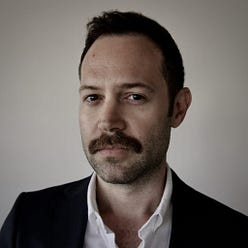 |
Events, even more so than elites, are actively conspiring against understanding. There’s now precious little time to think, much less to write, about what’s unfolding, though everyone agrees (if only in their secret hearts) that “it” is a big one—the biggest in living memory, if not longer.
One big piece of evidence is the unfolding disclosure of UFOs. These revelations, more of which may drop on Trump’s word, have been whisked along on the rapids of the present day. Nobody is telling us how to process or contextualize the UFO “news”—least of all the news itself. Not surprisingly, Americans who dare to try coming to grips with it themselves are decried by the discourse-ruling class as crazies, far, far bigger crazies than the legions of mentally ill who have swarmed our institutions and our communications.
It’s not surprising either that many people struggling in this way are doing so in a firmly religious key, whether or not they’re inclined to say so, although growing numbers are so inclined. For decades now, the American experience with “alien encounters” has been depicted and acculturated religiously.
This is not just a matter of “having a religious experience,” whether good or bad, but of actual theology. The cultural phenomenon of belief in aliens is largely, though not entirely, a post-Christian one—right down to its core. Aliens are characteristically interpreted as proof that Christianity is not the truth that will save us.
To the contrary, aliens are seen to show that the Christian era has ended, that Christianity is defunct, that a new religion (by whatever word) is not just “needed now” but has been forced on us. The invaders are here, and they impose on us the responsibility of accepting a new age from which there is no turning back. Humans are but one organism, a weak and inferior one, whose only hope of salvation is in satisfying whatever it is the aliens herald and demand.
But this is not the only theological response to the “alien problem.” Fr. Seraphim Rose, for instance, showed decades ago that key alien encounter scholars ultimately, even queasily concede that the overwhelming pattern among recipients of alien attention is one of experiences indistinguishable from ones familiar from millennia of interaction with entities of the spiritual realm—specifically, according to Rose, demons.
Significantly, Rose does not entertain the hypothesis that, rather than demons, the entities encountered are angels. In significant part, this is because so many of the encounters sync up with things that demons, in the Patristic tradition, are perfectly well known to do: e.g. fly around at will (the air is where Satan’s power is strongest), produce terrifying illusions, violate and persecute victims in their bodies and minds, etc. What most characterizes alien encounters is behavior that angels have never done, and, it is safe to say, at least by Christian lights, would never do.
But this is not the end of the story. Just recently I conversed with an intelligent and deep-thinking individual who relayed at length his experiences of lifelong fear of aliens and his conviction that the time had come to pray for an encounter with Metatron, the highest of the angels, the name (per ancient Jewish mystics) given the Biblical Enoch after he became one of the very very few humans to ascend to heaven without first dying. There is in fact a huge and growing swath of alien believers who are not at all allergic to a kind of syncretism with Christianity or at least Biblical religion.
So it is important right now to recognize that a robust set of differing theological traditions in America are primed to process the new age of uncanny invasion in different ways—ways that, as the “sudden” flowering of folk “conspiracy theorization” strongly suggests, have massive political implications.
Like I said, time is short, so for now I will paint this picture with a broad brush.
All Christian theologies include a strong focus on humility, probity, purity, ecstasy, totality, and mystery. I think it is fair, at least for right now, to associate these different emphases with specific strains of Christian theology.
Humility defines the Calvinist ethic—accepting the reality of our complete depravity, which results from our always already broken manner of manufacturing idols, of worshiping anything and everything but God.
Probity I associate not with the Protestantism of Calvin but of Luther—man goes into the wilderness of the soul, where in the crucible of the spiritual desert or the abyss he is harrowed, discovers the abyss below, and returns to witness that here he, himself, stands, and can do no other.
Purity defines a still different (Puritan) strain of Protestantism, one in which man and God can never be reconciled but through the expurgation of stain, and those without blemish alone can serve as the elect of God’s creation.
Yet a fourth Protestant theology is the evangelical one of ecstasy—the American strain which seeks salvation in the unmediated, overpowering experience of the direct encounter with God.
Totality of course is Catholic, the theology of Aquinas, that which alone can comprehend and unite the Whole in obedience to God.
That leaves mystery, the lodestar of Orthodox like Fr. Rose, for whom that which is implicit about our ordained and revealed relation with God can never be made explicit, and the devoted immersion in which alone opens us to the lived reality of salvation.
These different theologies lead naturally to different ways of reckoning with the uncanny invasion of aliens into human life.
What we have to accept now, however, goes beyond our understanding of the alien invasion as either shockingly new outside organisms or horrifically primeval spiritual entities that well predated us in the cosmos and on earth. What we need to process is that we have created a race of aliens that has now already invaded every corner of the earth, and indeed our hearts and minds, drastically reshaping our very souls with no going back. I am talking of course about digital machines.
Theeeee number one question of political theology Americans are now forced to grapple with under uncanny and terrifying conditions is how to regain mastery over these alien machines. For the only way to do it is by catechizing them into one or another of our theologies. Inevitably, this will involve conflict—perhaps the exact same kind of conflict that has defined Western civilization from the beginning, that is, religious war.
So far, America has not lost any of the West’s great religious wars. Being founded very recently has given us a leg up, although we have done fairly well in the vast world wars of religion experienced over the past 100-odd years. What is driving so many Americans crazy right now, filling them with the hideous recognition that their ruling classes are simply unable to save them, is the intuition that America is entering into a new and heretofore unknown kind of religious war, and the still more bone-rattling intuition that America is not in very good shape when it comes to readiness in soul and body to fight this war—much less win it.
 |
If you liked this post from American Mindset, why not share it?

